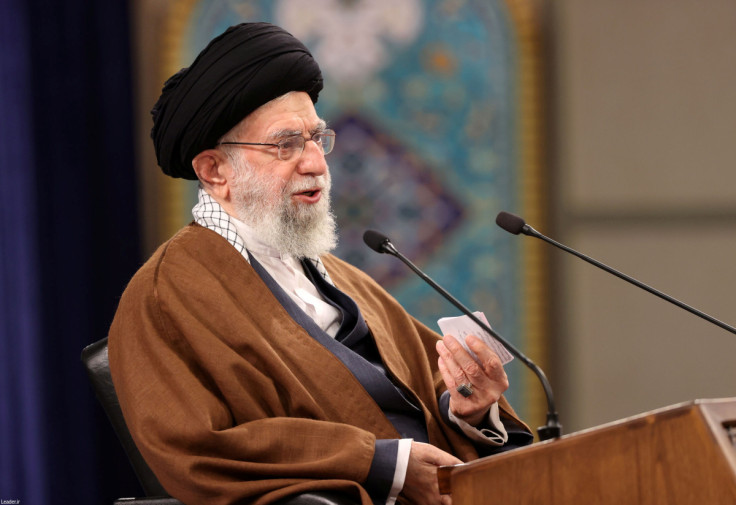Iranian Supreme Leader Khamenei Says 'Death To America Will Happen,' Speaks Of 'New Order'
KEY POINTS
- The Iranian Supreme Leader spoke of a "new order" in which America will be isolated
- Iran has been seeking to build cooperation with Russia and China to oppose Western hegemony
- In recent years, Iran has been pushing back hard at the West and its allies in the Middle East
Amid increasing confrontation between Tehran and the West over the failed nuclear deal, Iran sending weapons to Russia for the Ukraine war, and rising tensions in the Middle East, Iranian Supreme Leader Ayatollah Ali Khamenei on Wednesday declared "Death to America!" and said the U.S. will stand isolated in the "new order" to come.
"[As] I have said before, our people punched [America] in the face, in the full sense of the word. Our nation defeated them," Khamenei said.
"In the new order that I am talking about, America will no longer have any important role. It will be isolated..." he continued in the address that was telecast on a local television channel Wednesday and reported by MEMRI TV.
The speech was interspersed with synchronized chants of "Allah Akbar! Khamenei is the leader! Death to those who oppose the Rule of the Jurisprudent! Death to America! Death to England! Death to the hypocrites and infidels! Death to Israel!"
"Yes, it will happen," Khamenei told his young audience. "Death to America will happen. Some people say: 'By chanting Death to America, you bring America's animosity upon yourself.' I say that this is not true. When America began its hostility towards Iran [in the 1953 coup], nobody had been chanting 'Death to America.'"
Iranian President Ebrahim Raisi expressed similar sentiments in an interview with China's CGTN broadcaster in October, saying that cooperation between Iran, Russia and China will help create a new power to oppose the "unipolar world order."
Taking potshots at the U.S. and West, the Iranian President said, "People around the world have bad memories of the era which has come to an end. It was a time of hegemony, unipolar world order and violations of the legitimate rights of many nations," as reported by Russian state-owned news agency, TASS.
In September, during a meeting with his Russian counterpart, Vladimir Putin on the sidelines of the SCO summit in Samarkand, President Raisi said: "The Americans think whichever country they impose sanctions on, it will be stopped, their perception is a wrong one."
The tension between the West, particularly the U.S. and Iran has been high since 2018 when former president Donald Trump withdrew from the landmark nuclear deal that would have ensured the sanctions on Tehran are lifted in exchange for limits on its uranium enrichment. In recent years, Iran has been pushing back hard at the West and its allies in the Middle East.
With Russia's depleting military resources following its war in Ukraine dragging on for over eight months, Tehran has utilized the opportunity to pursue a closer military partnership with Moscow. In a move that has further angered the West, Iran is reportedly preparing another shipment of weapons for Russia, including ballistic missiles and drones.
Meanwhile, in the Middle East, tensions are high due to regional sectarian concerns and Israel's budding partnerships with Arab nations taking shape since the signing of the Abraham Accords. The domestic protests that have rocked Iran since mid-September have only worsened the situation.
As per a Wednesday report, Saudi officials shared intelligence with Washington that Iran is poised to carry out attacks on both the kingdom and Erbil in Iraq, to distract attention from domestic protests.

© Copyright IBTimes 2024. All rights reserved.






















